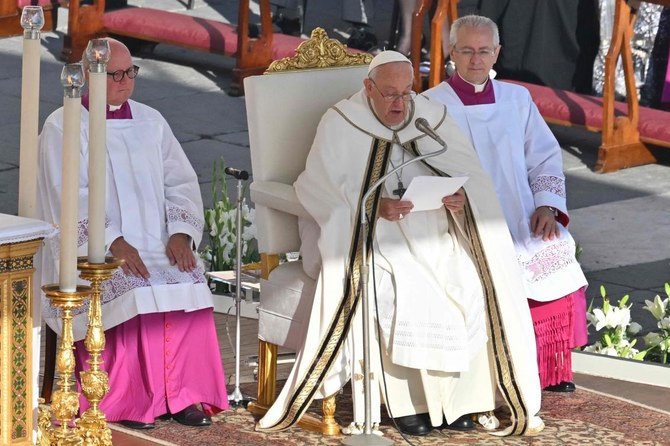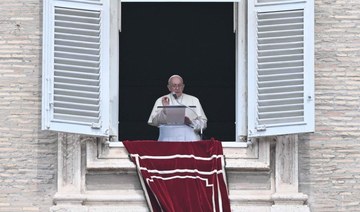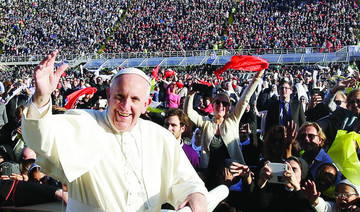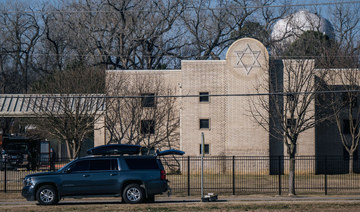VATICAN CITY: Pope Francis opened a big meeting on the future of the Catholic Church on Wednesday, with progressives hoping it will lead to more women in leadership roles and conservatives warning that church doctrine on everything from homosexuality to the hierarchy’s authority is at risk.
Francis presided over a solemn Mass in St. Peter’s Square to formally open the meeting, with hundreds of clergy from around the world celebrating on the altar before the rank-and-file Catholic laypeople whose presence and influence at this meeting marks a decisive shift for the Catholic Church.
Rarely in recent times has a Vatican gathering generated as much hope, hype and fear as this three-week, closed-door meeting, known as a synod. It won’t make any binding decisions and is only the first session of a two-year process. But it nevertheless has drawn an acute battle line in the church’s perennial left-right divide and marks a defining moment for Francis and his reform agenda.
Even before it started, the gathering was historic because Francis decided to let women and laypeople vote alongside bishops in any final document produced. While fewer than a quarter of the 365 voting members are non-bishops, the reform is a radical shift away from a hierarchy-focused Synod of Bishops and evidence of Francis’ belief that the church is more about its flock than its shepherds.
“It’s a watershed moment,” said JoAnn Lopez, an Indian-born lay minister who helped organize two years of consultations prior to the meeting at parishes where she has worked in Seattle and Toronto.
“This is the first time that women have a very qualitatively different voice at the table, and the opportunity to vote in decision-making is huge,” she said.
On the agenda are calls to take concrete steps to elevate more women to decision-making roles in the church, including as deacons, and for ordinary Catholic faithful to have more of a say in church governance.
Also under consideration are ways to better welcome of LGBTQ+ Catholics and others who have been marginalized by the church, and for new accountability measures to check how bishops exercise their authority to prevent abuses.
Women have long complained they are treated as second-class citizens in the church, barred from the priesthood and highest ranks of power yet responsible for the lion’s share of church work — teaching in Catholic schools, running Catholic hospitals and passing the faith down to next generations.
They have long demanded a greater say in church governance, at the very least with voting rights at the periodic synods at the Vatican but also the right to preach at Mass and be ordained as priests or deacons.
While they have secured some high-profile positions in the Vatican and local churches around the globe, the male hierarchy still runs the show.
Before the opening Mass got under way, advocates for women priests unfurled a giant purple banner reading “Ordain Women.”
Lopez, 34, and other women are particularly excited about the potential that the synod might in some way endorse allowing women to be ordained as deacons, a ministry that is currently limited to men.
For years supporters of female deacons have argued that women in the early church served as deacons and that restoring the ministry would both serve the church and recognize the gifts that women bring to it.
Francis has convened two study commissions to research the issue and was asked to consider it at a previous synod on the Amazon, but he has so far refused to make any change. He has similarly taken off the table debate on women priests.
Miriam Duignan, from the group Women’s Ordination Worldwide, said advocates want the synod to recognize that women were ministers in the early church “and they need to be restored to ministry.”
“The Catholic people around the world in every country have spoken and they have all mentioned women priests,” she said at a prayer vigil on the eve of the meeting. “They can see in their parishes, in their communities, that women are doing the work of priests. They are just not allowed to be recognized as priests.”
The potential that this synod process could lead to real change on previously taboo topics has given hope to many women and progressive Catholics and sparked alarm from conservatives who have warned it could lead to schism.
They have written books, held conferences and taken to social media claiming that Francis’ reforms are sowing confusion, undermining the true nature of the church and all it has taught over two millennia. Among the most vocal are conservatives in the US
On the eve of the meeting, one of the synod’s most outspoken critics, American Cardinal Raymond Burke, delivered a stinging rebuke of Francis’ vision of “synodality” as well as his overall reform project for the church.
“It’s unfortunately very clear that the invocation of the Holy Spirit by some has the aim of bringing forward an agenda that is more political and human than ecclesial and divine,” Burke told a conference entitled “The Synodal Babel.”
He blasted even the term “synodal” as having no clearly defined meaning and said its underlying attempt to shift authority away from the hierarchy “risks the very identity of the church.”
In the audience was Cardinal Robert Sarah, who along with Burke and three other cardinals had formally challenged Francis to affirm church teaching on homosexuality and women’s ordination before the synod.
In an exchange of letters made public Monday, Francis didn’t bite and instead said the cardinals shouldn’t be afraid of questions that are posed by a changing world. Asked specifically about church blessings for same-sex unions, Francis suggested they could be allowed as long as such benedictions aren’t confused with sacramental marriage.
Pope Francis opens big Vatican meeting as battle lines are drawn on his reform project
https://arab.news/88a34
Pope Francis opens big Vatican meeting as battle lines are drawn on his reform project

- Gathering is historic because Francis decided to let women and laypeople vote alongside bishops in any final document produced
- Reform is a radical shift away from a hierarchy-focused Synod of Bishops




























